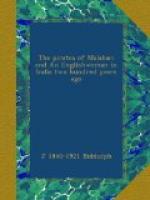forbidden; their Mahommedan servants left them, and
their creditors were made to give an account to the
Governor of all debts owing by Europeans. The
Dutch and French tried to exonerate themselves by laying
all the blame on the English, but the Governor refused
to make any distinction, and called on the three nations
to pay fourteen lakhs of rupees as a compensation
for the losses occasioned by piracy. Sir John
Gayer was a man of action. Like Macrae, to be
mentioned later in these pages, he had first brought
himself into notice as a sea-captain, and as Governor
of Bombay had upheld the Company’s interests
for four years, in circumstances of no ordinary difficulty.
The time for some decided action had arrived if the
Company’s trade was to continue. On receiving
intelligence of these occurrences, he appeared off
Surat with three armed ships, and sent word to the
Governor that he would neither pay any portion of
the fourteen lakhs, nor give security. At the
same time he intimated that he was ready to furnish
convoys for the Mocha ships, as he had already done,
and, in proof of good will in acting against the pirates,
pointed out that, now the war in Europe was at an end,
a royal squadron was on its way to the Indian seas
to extirpate them. The European traders on the
west coast had always been so submissive to the Emperor’s
authority that this unexpected display of vigour astonished
the Governor: he moderated his tone. The
Dutch declared they would abandon the Surat trade
rather than pay; so the Governor consented to make
no demand for past losses, if the English would engage
to make good all future losses by piracy. This
was also refused. Finally, the English, French,
and Dutch agreed to act in concert to suppress piracy,
and signed bonds by which they jointly engaged to
make good all future losses.
Onerous as these terms were, the agreement came not
a moment too soon. The news of it reached Aurungzeeb
just in time to procure the reversal of an order he
had issued, putting a final stop to all European trade
in his dominions. He told the Surat Governor
to settle the matter in his own way. In pursuance
of the agreement, the Dutch convoyed the Mecca pilgrims
and patrolled the entrance to the Red Sea, besides
making a payment of Rs.70,000 to the Governor; the
English paid Rs.30,000 and patrolled the South Indian
seas; while the French made a similar payment and policed
the Persian Gulf.
An experience of the Benjamin yacht at this
time showed that pirates were not prone to wanton
mischief, where there was no plunder to be gained.
In November, the yacht lay at Honore, taking in a cargo
of pepper, when the well-known pirate ships Pelican,
Soldado, and Resolution came into harbour
for provisions. Seeing the Bombay Governor’s
yacht, they naturally concluded that some attempt
would be made to prevent the natives from supplying
their wants. They at once sent word to the master
of the Benjamin that they had no intention




